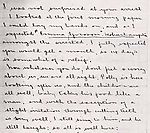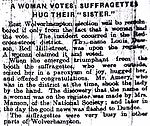 Emma Sproson
Emma Sproson Extract from a letter from husband Frank to Emma in prison 1907
Extract from a letter from husband Frank to Emma in prison 1907 Pankhurst election campaign, Smethwick, 1918
Pankhurst election campaign, Smethwick, 1918 Suffrage meeting disrupted
Suffrage meeting disrupted An error on the voters' register allows a woman votes in 1908
An error on the voters' register allows a woman votes in 1908

The Birmingham and Midlands branch of the National Union of Women’s Suffrage Societies (NUWSS) formed in 1902. Later, numerous branches were set up in the Black Country; Stourbridge in 1903 and Wolverhampton in 1904; West Bromwich in 1911;Walsall and Wednesbury in 1912 and Dudley in 1913.
The Women’s Social & Political Union (WSPU) also had local branches. Between 1906 and 1911 branches were formed in Wolverhampton, Stourbridge, Smethwick, Warley, Walsall and Kingswinford.
The Wolverhampton branch, led by Emma Sproson, appears to have been the most active. Emma, also known as 'Red Emma', along with her husband Frank, was an active campaigner and attended the first Women’s Parliament in February 1907. She, along with 50 other women, was arrested and, rather than pay a fine, was imprisoned for 14 days. A letter from Frank to Emma whilst in prison is included here. Emma’s imprisonment brought much sympathy and support from local people and organisations.
Emmeline Pankhurst and her daughter Christabel, the national leaders of the WSPU, were invited to speak at a number of meetings in the Midlands. November 1906 brought Emmeline Pankhurst to the Wolverhampton Labour Church. Nell Kenney, one of the most active of the London WSPU, also gave talks in Wolverhampton and Walsall in 1907.
In 1908 the local suffrage movement focussed its attention on the Spring by-elections in Wolverhampton East. They did everything they could to secure the defeat of the Liberal, George Rennie Thorne. Despite his public statement in favour of votes for women, the suffragettes had little confidence in a Liberal Government that had, for years, failed to bring about reform. Instead they campaigned on behalf of the Conservative candidate, LS Amery, also publicly committed to women's suffrage.
The WSPU brought in their national leaders and main campaigners to speak in the area. One such speech led to Annie Kenney challenging the Liberal speakers to share her pitch, allowing the audience to hear both sides together. The Liberals declined and left, much to the amusement of the crowd.
Emmeline and Christabel Pankhurst came back to Wolverhampton, in March 1908, to speak at the first meeting at The Empire Theatre. Meetings were held here every few days leading up to the elections, attracting larger audiences each time.
In March 1908 a suffrage meeting at the Co-operative Hall, Wolverhampton, was disrupted by a protester throwing a test tube of ‘Sulphuretted Hydrogen’, which injured a member of the audience.
April 1908 saw Wolverhampton Wanderers in a cup final at Crystal Palace. The suffragettes used the opportunity to fly a kite above the stadium and distribute leaflets in the team’s colours, inviting the wives to meet and discuss the election.
There was great joy amongst Wolverhampton suffragists during the May elections, when a voting card was issued in error to a Lois Dawson. As she appeared on the register under the man's name, Louis, she was able to attend the polling station and use the card to register her vote.
Unfortunately the Conservative candidate was unsuccessful, losing the seat by just eight votes. No doubt this was a blow to the suffragists, but the closeness of the vote suggests that they waged a very effective campaign, helping to create a significant swing away from the Liberals.
In September 1909 Asquith, the Liberal Prime Minister, who was extreme in his views against women’s suffrage, was planning to visit Birmingham and hold a meeting at Bingley Hall. Security stopped women from entering the hall, so male supporters disrupted the meeting on their behalf. Despite a canopy to stop women getting onto the roof, Mary Leigh and Charlotte Marsh managed to do so and proceeded to throw tiles at Asquith as he left the meeting.
The demonstrators were arrested and nine women were convicted. They were held at Winson Green prison. In response to their hunger strike, they were subjected to forced feeding.
In October of the same year a reception was held for Lady Constance Lytton at the Star and Garter Hotel in Wolverhampton. Herself a victim of forced feeding, she spoke publicly about her experience. The reception turned into a protest meeting as the true horrors of forced feeding were revealed.
A Walsall branch of the WSPU was set up in February 1911, with a meeting at the YMCA Hall in Freer St. Mrs Hugh A. Franklin spoke on ‘Why I struck Churchill’, an action which resulted in her spending a month in prison.
In 1912 the WSPU opened a shop and office at 19 Leicester St. Meetings continued to be held in the Temperance Hall, Freer St, and the Co-operative Rooms, Bridge St. every Thursday afternoon in the spring, and on Wednesday afternoons in the autumn.
April 1912 saw the outrage of the Dudley Castle canon being fired in the middle of the night. Upon investigation it was found that ‘Votes For Women’ had been painted on the canon. Some questions were raised in the Dudley Herald newspaper as to whether women would have been able to clean, prepare and fire a canon without the help of local men. It was concluded that young male sympathisers must have been responsible, and not the women themselves.
In 1913 the Birmingham Arson campaign started. Targets of the campaign included Rowley Church and houses in Olton, Selly Park and Four Oaks. However, there is some doubt as to whether or not the suffragettes were responsible for the church fire. Some blamed local strikers, who were annoyed by the vicar's views.
In July 1913 Asquith once again visited Birmingham. Police arrested local suffrage leaders prior to the visit in order to pre-empt any protests.Two of those arrested were Walsall organisers, Florence Ward and Louisa Shepherd.
A group known as the 'Friends of Suffrage' began collecting evidence that support had spread beyond the organised suffrage groups. In 1913 Wolverhampton NUWSS worked to gain support of local trade unions for the cause. 30 agreed to put the question of women's suffrage to their branches. Only 7 refused. The local National Union of Teachers, with 50 members, passed a resolution in favour of women’s suffrage with only 3 against (two men and a women).
On November 11th 1913, Keir Hardie, Britain’s first socialist MP and a founder of the Labour Party, spoke at Stourbridge Town Hall. He made several supportive references to women’s suffrage in his speech.
Although women's suffrage was the main focus of the various groups and branches, many other issues affecting women were considered, including sweated labour, factory and workshop legislation, tax issues, white slave traffic, and the state's role in respect of children.
The war years saw a reduction in activity nationally. In 1918, at the end of the war, women aged 30 and over were granted the vote, and were allowed to stand as parliamentary candidates for the very first time. Christabel Pankhurst stood in Smethwick as an Independent Patriotic candidate against Major SN Thompson, Coalition Party, and Mr John E Davison, Labour Party. No-one had anticipated that she would stand in Smethwick. It was understood that she would favour another constituency, but the Women's Party recognised that Smethwick offered the best opportunity for success. Smethwick, previously part of Handsworth, but now a new constituency, had no sitting member. It was a fair field with no favour or advantage for anyone. Nevertheless, she was defeated by the Labour candidate, who had a majority of only 775.
Rollover the captions in the box to see the available images in thumbnail format, click the caption to see the full-size image
| Reference: | 735 |
| Keywords: | |
| Archive Ref: | |
| Updated: | Thu 26 Jun 2008 - 1 |
| Interpretation written by | Jenny Ermoyenous |
| Author's organisation | Curatorial |
| Organisation's website |